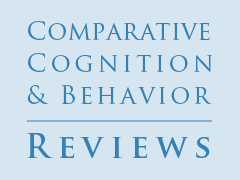The Prospective Cognition of Food Caching and Recovery by Western Scrub-Jays (Alphelocoma californica)
by Nicola S. Clayton,
University of Cambridge
Nathan J. Emery,
University of Cambridge
Anthony Dickinson,
University of Cambridge
Reading Options:
Download/Read PDF | Add to Endnote
Abstract
The role of prospective cognition in food caching and recovery by western scrub-jays (Aphelocoma californica) is reviewed. These birds anticipate the short-term consequences of searching for cached food at recovery by reducing their searches for devalued food items. Two further lines of evidence suggest that the jays are also capable of more long-term prospection. First, the caching of food items decreases when they are consistently degraded or pilfered at recovery over cache-recovery intervals that preclude direct delayed reinforcement and punishment. Second, the jays anticipate the pilfering of their caches by another bird, which observes the caching episode, by engaging in various cache-protection behaviors. These finding suggest that the jays are capable of a form of prospective mental “time travel”.
Clayton, N. S., Emery, N. J., & Dickinson, A. (2006). The prospective cognition of food caching and recovery by Western Scrub-Jays (Aphelocoma californica). Comparative Cognition & Behavior Reviews, 1, 1-11. Retrieved from https://comparative-cognition-and-behavior-reviews.org/ doi:10.3819/ccbr.2008.10001
